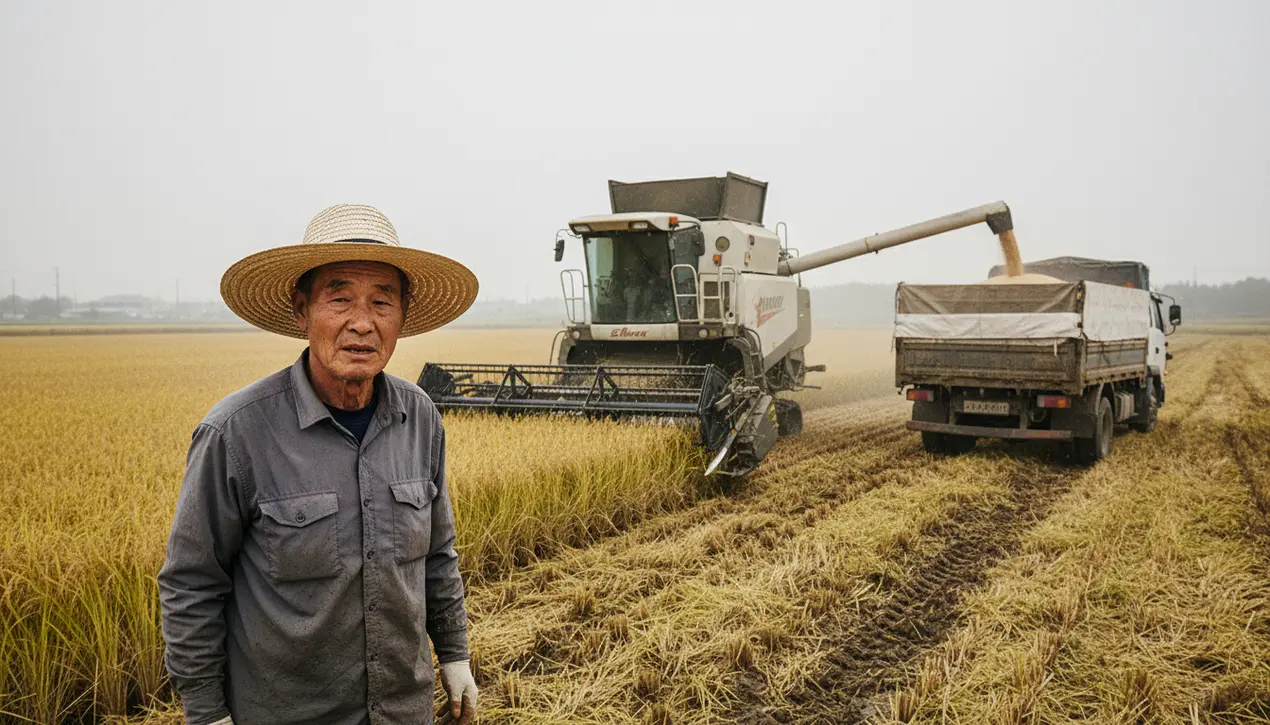
Otherweather & natural eventsExtreme Weather
South Korean Farmers Sue Utility Over Climate-Related Crop Damage.
RA
Rachel Adams
2 hours ago7 min read1 comments
Hwang Seong-yeol stood at the edge of a golden field, watching nervously as a combine harvester crawled through his rice, churning up mud and stalks. Its steady hum filled the damp autumn air as grain poured into a truck waiting at the other end of the muddy paddy.It was the final day of what Hwang said was one of his toughest seasons in three decades of farming. He and other farmers feel helpless against increasingly erratic weather that they link to climate change and damage to their crops.This sense of desperation has now culminated in a landmark legal action, with a coalition of over sixty South Korean farmers filing a lawsuit against Korea Electric Power Corporation (KEPCO), the state-owned utility they allege is a major contributor to the greenhouse gas emissions destabilizing their livelihoods. The plaintiffs, primarily from the country's agricultural heartlands like Jeolla and Gyeongsang provinces, are not merely seeking compensation for ruined harvests of rice, strawberries, and apples; they are demanding systemic accountability, arguing that the utility’s continued investment in and operation of coal-fired power plants abroad directly contravenes the South Korean government's own carbon neutrality pledges and represents a profound failure of corporate responsibility.The case, filed in the Seoul Central District Court, hinges on establishing a tangible line of causation between corporate emissions and specific, localized agricultural losses—a legal frontier being tested in courtrooms from the Netherlands to the United States. Data from the Korean Meteorological Administration paints a stark backdrop: the past decade has seen a 15% increase in extreme precipitation events during the critical monsoon season, while unseasonal late frosts and prolonged heatwaves have become distressingly common, disrupting pollination and leading to widespread crop failure.For a country where rice is not just a staple but a cultural touchstone, these shifts are more than economic; they represent a fraying of a way of life that has sustained rural communities for generations. Professor Kim Jae-hee, an agricultural climatologist at Seoul National University, explains, 'The phenological cycles of our key crops are finely tuned to historical climate patterns.What we are witnessing now is a rapid decoupling. The plants are not adapting quickly enough, and neither are our agricultural policies.' The lawsuit against KEPCO specifically points to the utility's portfolio of overseas coal projects in countries like Indonesia and Vietnam, which, according to a 2023 report from the Institute for Energy Economics and Financial Analysis, collectively emit more carbon dioxide annually than the entire nation of Portugal. This legal strategy, echoing the successful case against Shell in the Hague, seeks to pierce the corporate veil and hold a domestic entity responsible for its international carbon footprint.A ruling in the farmers' favor could set a powerful precedent, potentially opening the floodgates for similar litigation across Asia and forcing a fundamental reassessment of how state-owned enterprises in rapidly developing economies account for their environmental externalities. Conversely, a dismissal would be a devastating blow to climate-vulnerable communities seeking redress through the judicial system, reinforcing the immense challenge of attributing blame in a globally interconnected atmospheric system.Beyond the courtroom, this conflict underscores a deeper societal tension in South Korea between its advanced technological ambitions and the fragile, earth-bound realities of its agricultural sector. As the nation pushes forward with a green growth strategy, the plight of farmers like Hwang serves as a poignant, soil-stained reminder that true sustainability requires not just innovation for the future, but also justice and support for those on the front lines of a climate crisis already underway.
#climate change
#South Korea
#farmers
#lawsuit
#coal power
#crops
#extreme weather
#featured
Stay Informed. Act Smarter.
Get weekly highlights, major headlines, and expert insights — then put your knowledge to work in our live prediction markets.
Comments
Loading comments...
© 2025 Outpoll Service LTD. All rights reserved.